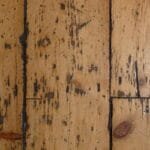- The Break down: DIY costs and sustainability factors
- 1. Refinishing Existing Wood Floors (DIY)
- 2. DIY Floor Replacement Costs by Material
- A. Vinyl Flooring (Luxury Vinyl Planks/Tiles or Sheet Vinyl)
- B. Bamboo Flooring (Solid or Engineered)
- C. Engineered Wood Flooring
- Cost & Sustainability Summary
- Final Thoughts: Should You Refinish or Replace?
Flooring: Refinishing vs. Replacement.

Before I pitched my floor refinishing plans to “he-who-must-have-his-say, “ I wanted to compare the price and the environmental impact of refinishing vs. replacement.
In thiscomparison I use three of the most widely used floorings, available at your local building or hardware store.
The Break down: DIY costs and sustainability factors
1. Refinishing Existing Wood Floors (DIY)
- Refinishing is often the most sustainable and cost-effective option.
- It keeps existing materials out of landfills and avoids the resource-heavy manufacturing of new flooring.
- However, replacement comes with a higher environmental and financial cost.
DIY Costs:
- Sander Rental: $50 – $80 per day
- Eco-Friendly Floor Paint or Stain: $20 – $50 per gallon
- Eco-Friendly Sealer/Varnish: $40 – $100 per gallon
- Miscellaneous Supplies (sandpaper, brushes, safety gear): $50 to $100
Total Cost Per Sq. Ft.: $1.50 – $3.00
For 500 Sq. Ft.: $750 – $1,500
Disposal Considerations:
- Sanding dust may contain old toxic finishes. Dispose of it as hazardous waste if working with pre-1978 floors.
- Water-based finishes are safer and can be disposed of normally.
- Oily rags can spontaneously combust—store them in a sealed metal container with water before disposal.
Sustainability Impact:
- Extends floor lifespan without adding to landfill waste
- Lower carbon footprint than manufacturing and shipping new flooring
- Eco-friendly finishes available for a non-toxic, low-VOC result
2. DIY Floor Replacement Costs by Material
If refinishing isn’t an option, your floors are beyond repair and can’t be sanded. Or, if you want a different look—here’s what to expect cost-wise.
A. Vinyl Flooring (Luxury Vinyl Planks/Tiles or Sheet Vinyl)
- Material Cost: $2 – $7 per sq. ft.
- Underlayment (if needed): $0.50 – $2 per sq. ft.
- •Adhesive (for glue-down types): $0.50 – $1 per sq. ft.
- Misc. Supplies (trim, transition strips, tools): $100 – $200 total
- Total Cost Per Sq. Ft.: $2 – $10
- For 500 Sq. Ft.: $1,000 – $5,000
Sustainability Considerations:
- ❌ Made from PVC (plastic), which has a high carbon footprint
- ❌ Not biodegradable and difficult to recycle
- ✔ Long lifespan (10-25 years) but still wasteful when replaced
B. Bamboo Flooring (Solid or Engineered)
•Material Cost: $2 – $10 per sq. ft.
- Underlayment (for floating floors): $0.50 – $2 per sq. ft.
- Adhesive (for glue-down types): $0.50 – $1 per sq. ft.
- Misc. Supplies (trim, transition strips, tools): $150 – $300 total
Total Cost Per Sq. Ft.: $3 – $12
For 500 Sq. Ft.: $1,500 – $6,000
Sustainability Considerations:
- ✔ Bamboo grows quickly, making it a renewable option
- ✔ Some brands use low-VOC adhesives (look for FSC-certified bamboo)
- ❌ Imported from Asia, so it has a higher carbon footprint than local wood
C. Engineered Wood Flooring
Material Cost: $3 – $16 per sq. ft.• Underlayment (if required): $0.50 – $2 per sq. ft.
Adhesive (for glue-down types): $0.50 – $1 per sq. ft.
Misc. Supplies (trim, transition strips, tools): $150 – $300 total
Total Cost Per Sq. Ft.: $4 – $19
For 500 Sq. Ft.: $2,000 – $9,500
Sustainability Considerations:
- ✔ Uses less hardwood than solid wood flooring
- ✔ Some brands offer recycled or FSC-certified options
- ❌ Not as long-lasting as refinished solid wood floors
Cost & Sustainability Summary
| Floor Type | Cost per Sq. Ft. | Total for 500 Sq. Ft. | Sustainability Impact |
|---|---|---|---|
| Refinished | $1.50 – $3 | $750 – $1,500 | ♻ Best option – No landfill waste, lower carbon footprint |
| Vinyl | $2 – $10 | –$1,000– $5,000 | ❌ High plastic content, hard to recycle |
| Bamboo | $3 – $12 | $1,500 – $6,000 | ♻ Renewable |
| Engineered Wood | $4– $10 | $2,000 – $9,500 | ♻ Uses less wood, but has adhesives |
Final Thoughts: Should You Refinish or Replace?
If your existing floors are structurally sound, refinishing is the cheapest and most eco-friendly option.
And if you must replace, bamboo or engineered wood is better than vinyl from a sustainability perspective.
If you want the easiest DIY install, vinyl plank flooring is the simplest, but vinyl is the worst for the environment.
Are you thinking of sanding your floors? – here’s the how-to guide.
